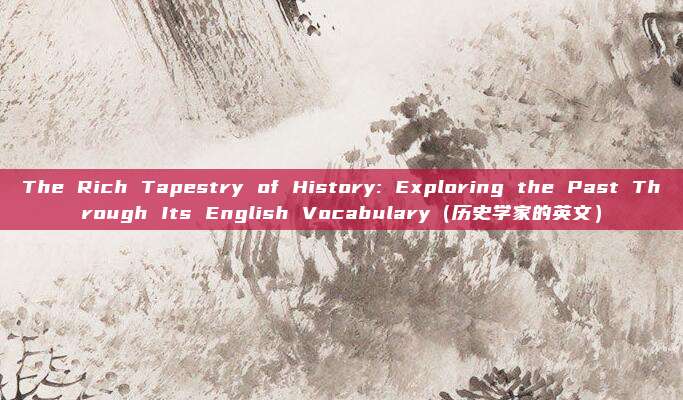The Rich Tapestry of History: Exploring the Past Through Its English Vocabulary(历史学家的英文)
温馨提示:这篇文章已超过225天没有更新,请注意相关的内容是否还可用!
Introduction:
History, as we know it, is a fascinating journey through time that allows us to understand the world we live in today. One of the most captivating aspects of history is the wealth of words and phrases that have been passed down through generations. English, as a global language, has absorbed and adapted many of these terms, enriching our vocabulary and providing a window into the past. This article delves into the world of historical English words and phrases, offering insights into their origins and usage.
Body:
1、The Evolution of Historical English Words

The English language has a rich history of borrowing words from other languages, including Latin, Greek, Old French, and Old Norse. Many of these words have historical connotations and are still in use today. For instance, "bureaucracy," derived from the Greek word "bureaucracy," refers to the administrative system of a government. Another example is "alchemy," which comes from the Arabic word "al-kimia" and refers to the ancient practice of trying to turn base metals into gold.
2、Historical Words and Their Modern Usage
Many historical English words have evolved in meaning over time. For instance, the word "charter" originally referred to a document granting certain rights or privileges to individuals or groups. Today, it is commonly used to describe a contract or agreement. Similarly, "renaissance" was once a noun referring to the cultural movement in Europe during the 14th to 17th centuries, but it is now often used as an adjective to describe something that has been rejuvenated or restored to its former glory.
3、The Power of Historical English in Literature and Film
Historical English words and phrases are often used in literature and film to add depth and authenticity to the narrative. For example, J.K. Rowling's "Harry Potter" series incorporates many historical words, such as "muggle" (a non-magical person) and "wizards" (male wizards). Similarly, in the film "The King's Speech," the use of historical English terms like "speech therapy" and "stammering" helps to create an immersive experience for the audience.
4、The Role of Historical English in Academic Research
Academic research often relies on historical English words to convey complex ideas and concepts. For instance, "semiotics," derived from the Greek word "semeion," refers to the study of signs and symbols. This term is crucial in fields like linguistics, literature, and philosophy. Additionally, historical English words like "quintessential" and "iconic" are commonly used to describe the essential qualities or characteristics of a particular object or person.
5、The Importance of Historical English in Preserving Cultural Heritage
The use of historical English words and phrases helps to preserve the cultural heritage of a society. By maintaining these terms, we ensure that the history and traditions of our ancestors are not forgotten. For instance, the word "folklore" is derived from the Old English term "fola" (folk) and "leore" (lore), meaning the traditional stories and customs of a people. By using this term, we pay homage to the rich cultural history that has shaped our world.
Conclusion:
The study of historical English words and phrases provides us with a valuable tool to understand the past and appreciate the linguistic evolution of our language. By exploring the origins and usage of these terms, we gain insight into the customs, traditions, and cultural heritage of previous generations. As we continue to preserve and use historical English, we honor the rich tapestry of history that has shaped our world.
网站文章、图片来源于网络,以不营利的目的分享经验知识,版权归原作者所有。如有侵权请联系删除!





还没有评论,来说两句吧...